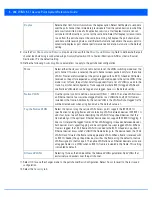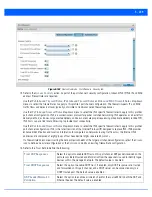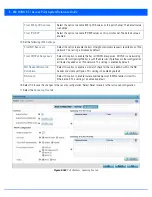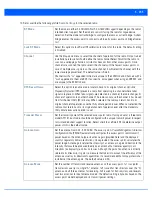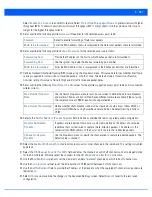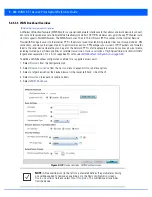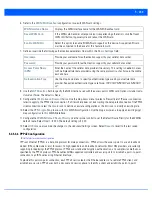
5 - 262 WiNG 5.7.1 Access Point System Reference Guide
5.4.5.3.5 WAN Backhaul Overrides
Profile Interface Override Configuration
A
Wireless Wide Area Network
(WWAN) card is a specialized network interface card that allows a network device to connect,
transmit and receive data over a Cellular Wide Area Network. Certain AP7131N model access points have a PCI Express card
slot that supports 3G WWAN cards. The WWAN card uses
Point to Point Protocol
(PPP) to connect to the Internet Service
Provider (ISP) and gain access to the Internet. PPP is the protocol used for establishing internet links over dial-up modems, DSL
connections, and many other types of point-to-point communications. PPP packages your system’s TCP/IP packets and forwards
them to the serial device where they can be put on the network. PPP is a full-duplex protocol used on various physical media,
including twisted pair or fiber optic lines or satellite transmission. It uses a variation of
High Speed Data Link Control
(HDLC)
for packet encapsulation. For a list of supported 3G cards, see
WAN Backhaul Configuration on page 5-60
To define a WAN Backhaul configuration override for a supported access point:
1. Select
Devices
from the Configuration tab.
2. Select
Device Overrides
from the
Device
menu to expand it into sub menu options.
3. Select a target device from the device browser in the lower, left-hand, side of the UI.
4. Select
Interface
to expand its submenu items
5. Select
WAN Backhaul
.
Figure 5-170
Device Overrides - WAN Backhaul screen
NOTE:
A blue override icon (to the left of a parameter) defines the parameter as having
an override applied. To remove an override, go to the
Basic Configuration
screen’s
Device Overrides
field and select
Clear Overrides
. This will remove all overrides
from the device.
Summary of Contents for WiNG 5.7.1
Page 1: ...WiNG 5 7 1 ACCESS POINT SYSTEM REFERENCE GUIDE ...
Page 2: ......
Page 3: ...WING 5 7 1 ACCESS POINT SYSTEM REFERENCE GUIDE MN001977A01 Revision A April 2015 ...
Page 4: ...ii WiNG 5 7 1 Access Point System Reference Guide ...
Page 24: ...1 4 WiNG 5 7 1 Access Point System Reference Guide ...
Page 36: ...2 12 WiNG 5 7 1 Access Point System Reference Guide ...
Page 72: ...3 36 WiNG 5 7 1 Access Point System Reference Guide ...
Page 470: ...5 386 WiNG 5 7 1 Access Point System Reference Guide ...
Page 472: ...6 2 WiNG 5 7 1 Access Point System Reference Guide Figure 6 1 Configuration Wireless menu ...
Page 624: ...7 46 WiNG 5 7 1 Access Point System Reference Guide ...
Page 724: ...9 56 WiNG 5 7 1 Access Point System Reference Guide ...
Page 783: ...12 35 Figure 12 46 Device Summary screen 4 Click File Management ...
Page 816: ...12 68 WiNG 5 7 1 Access Point System Reference Guide ...
Page 1006: ...13 190 WiNG 5 7 1 Access Point System Reference Guide ...
Page 1026: ...14 20 WiNG 5 7 1 Access Point System Reference Guide ...
Page 1028: ...A 2 WiNG 5 7 1 Access Point System Reference Guide ...
Page 1089: ......
Page 1090: ...MN001977A01 Revision A April 2015 ...

